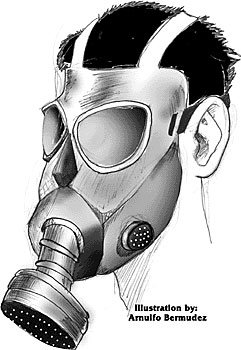
Illustration by Arnulfo Bermudez
|
By David Halperin
Arizona Daily Wildcat
Friday February 21, 2003
This column is the second of a series of commentaries highlighting the experiences of an international exchange student in Israel.
January 28 ÷ Election night
"My father is going to kill me," my Israeli friend gasped as we ran full sprint about two miles from our dormitory complex to the convention center holding the Likud victory party. We had been watching the Israeli election coverage minutes before, when we saw Ariel Sharon's entourage on television driving near the university and decided to make a run to the victory party to catch his speech. My friend, a devout supporter of the left-wing Meretz party and no fan of Ariel Sharon, had been agonizing throughout the night over Meretz's huge loss in Knesset seats, from 10 to six, and the sudden resignation of the party's leader Yossi Sarid. We arrived mid-way through the address and entered the hall packed with television crews and decorated Likud supporters. My friend translated Sharon's speech for me as we pushed our way into the crowd. When the speech concluded, the crowd went into a frenzy. We suddenly noticed a cameraman from an Israeli news station panning in our direction. I continued to smile and look around aimlessly as my Israeli friend ducked behind me to avoid being seen as a supporter of Sharon and the Likud.
This election was over long before it started, all one had to do was read the election ads. While the Likud's billboards proclaimed that "The People Want Sharon," the divided Labor party called for the people to "Believe in Mitzna," implying what the majority knew, but the people didn't. Israel's third election in only four years resulted in a 68.5-percent voter turnout, Israel's lowest in more than 50 years. While the religious and conservative voters came out in full force, the low turnout was attributed to the liberal and secular voters who stayed home, desperate but tired of searching for an alternative. And who could blame them? What else can be done? How is it possible to compete with a right wing that promises to use any means necessary to ensure the two words everyone here wants to hear, "national security?" The Likud would ultimately jump from 19 to 38 seats in the 120-seat Knesset, finalizing Israel's move to the political right. So for now, while Israel continues to do what it can and must do for its national security, the political left is left · hiding from the cameras.
February 1 ÷ Columbia tragedy
I was in the weight room at the university sports centre in the late afternoon, when I noticed a small crowd of people begin to gather near one of the television sets in the far corner. Suddenly, the music in the gym was turned off, and every television was changed simultaneously to CNN's coverage of the Columbia's failed return from space. Everyone stopped exercising and stared at the televisions in disbelief. Just by the faces I could tell what everyone was thinking: This could not be happening.
Israel had been in a frenzy when Ilan Ramon was sent to space. Ramon was a decorated soldier with the perfect smile from Ramat Gan, who among other things brought a drawing of the earth drawn by a child killed in the Holocaust with him into space. A society in desperate need of a hero finally had one.
The routine was the same as when there is a terrorist attack here ÷ cell phones began to ring and televisions and radios were turned to the news. But this was no terrorist attack and this was not routine. It's not that the people here are used to terror, they simply know how to deal with it, and move on with their lives.
But with this there was no one to be angry at, and nothing that could be done.
February 10 ÷ Preparing for the worst
To be honest, I don't think I had ever seen a gas mask before I tried one on. The university explained that they decided to issue the masks to appease concerned parents, and that the army had not issued any order to do so.
I imagine on regular study abroad programs the main concern is what to do, where to go, what to see. But of course, this is not your average study abroad program. Sure, we talk about the same stuff, what to do this weekend, and which clubs to go to. But lately, the hot topic of conversation is, "Where are you going if there's a war? To the north? The south?"
For a second I forgot to keep breathing as I looked through the glass plate of my new gas mask as a university staff member told me how to inject myself with a nerve gas shot that accompanied the mask kit.
I'm sure I thought what every overseas student and Israeli thinks when trying on a mask: "I hope I never have to wear this thing again."
David Halperin is a UA poltical science and Judaic studies senior studying at Tel Aviv University this semester. He can be reached at letters@wildcat.arizona.edu.

